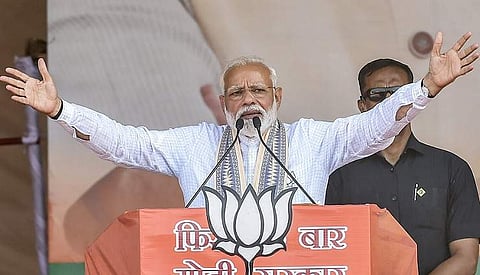

The media in New Delhi was furiously speculating on whether Imran Khan would be arriving for the swearing in of Mr Modi, for his second term as Prime Minister. They were, however, unaware of a decision by Mr Modi that consistent with the change in India’s foreign policy perspectives, SAARC, of which Pakistan is a member, is no longer the fulcrum of India’s approach to regional cooperation. The focus has moved from SAARC to BIMSTEC. The BIMSTEC grouping links India with its eastern neighbours: Nepal, Bhutan, Bangladesh, Myanmar, Thailand and Sri Lanka.
The logic for this change is uncontestable. Pakistan had single-handedly blocked any meaningful regional cooperation in SAARC, in crucial areas like economic integration, regional connectivity and terrorism. Its approach to cooperation on terrorism was particularly objectionable. Three fellow members—India, Afghanistan and Bangladesh—openly hold Pakistan responsible for promoting terrorism on their soil. Pakistan backs radical groups in Bangladesh, such as the Jamaat-ul-Mujahideen, Harkat-ul-Jihad al-Islami and the Jamaat-e-Islami. Moreover, Afghanistan was seeing no change in the ISI’s programme of arming, training and providing safe haven and logistical support to the Taliban.
While SAARC members signed a Free Trade Agreement in Kathmandu in 2004, Pakistan alone has not implemented it. It has placed barriers to even normal MFN trade with India, as required under WTO norms. It was in these circumstances that India made it clear that it would not attend the SAARC Summit in Islamabad, after the terror strikes in Pathankot and Uri in 2016. Afghanistan and Bangladesh joined India almost immediately, informing Pakistan about problems of terrorism they were facing, whose roots could be could be traced to Pakistan. While the SAARC Secretariat continues to function, Pakistan has been effectively prevented from indulging in its propensity for anti-India activity, in a regional grouping.
This development is important at a time when India is receiving full cooperation from its eastern neighbours, in dealing with separatism and terrorism. Even as Myanmar President Win Myint was arriving in India, our Eastern Army commander, Lt Gen Naravane, expressed happiness at the actions of their army, which had cracked down on a number of Indian insurgent groups from Assam, Nagaland, Mizoram and Manipur. These groups were seeking safe haven and support in Myanmar and also crossing into China’s Yunnan Province. Bangladesh has taken similar action against such groups. Thailand provides information and support on members of Indian separatist groups seeking safe haven on Thai soil. BIMSTEC has also become a forum for close ties between the armies of member-countries.
The arc of cooperation between Indian Ocean States widened, with the visits of PM Modi to the Maldives and Sri Lanka. The visit to the Maldives has reinvigorated security and economic ties with what has traditionally been very friendly neighbour. It has also set the stage for greater cooperation across the Indian Ocean. As the attack on churches in Sri Lanka demonstrated, the ISIS’s tentacles have now moved from Iraq and Syria to Afghanistan, Maldives, Sri Lanka and even southern India. Cooperation between India, Sri Lanka and Maldives in combating radicalism and terrorism now assumes greater importance.
G Parthasarathy
Former diplomat
dadpartha@gmail.com